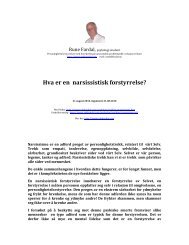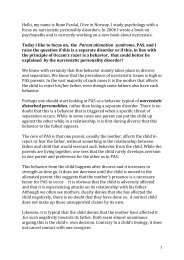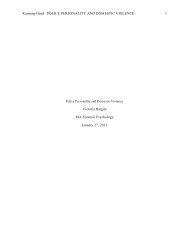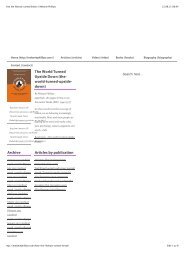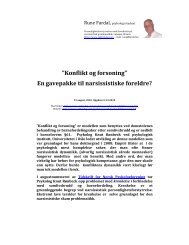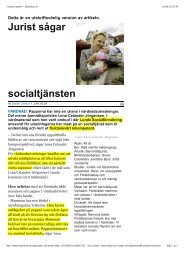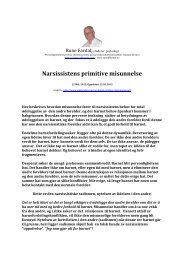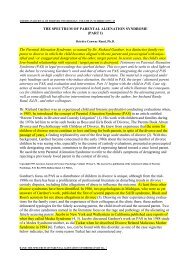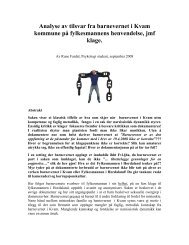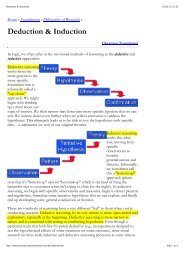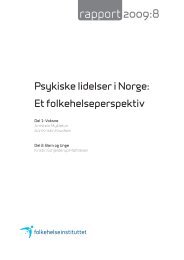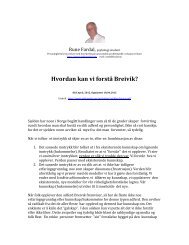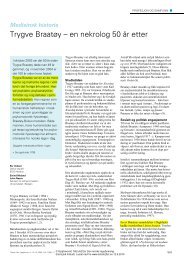The origins of narcissism and narcissistic personality disorder a
The origins of narcissism and narcissistic personality disorder a
The origins of narcissism and narcissistic personality disorder a
You also want an ePaper? Increase the reach of your titles
YUMPU automatically turns print PDFs into web optimized ePapers that Google loves.
THE ORIGINS OF NARCISSISM 85<br />
finally comes to recognize oneself as merely an object among objects,<br />
a self among selves (Bach, 1985). Many criticisms can be made <strong>of</strong> this<br />
hypothesis, only a small number <strong>of</strong> which I will take up here.<br />
Limitations <strong>of</strong> the <strong>The</strong>ory <strong>of</strong> Reflexive Self-Awareness<br />
First, this theory, as stated, appears to be monocausal. It traces virtually<br />
all <strong>narcissistic</strong> phenomena to the coordination <strong>of</strong> two representational<br />
states. In this sense, the theory as stated is too broad, <strong>and</strong> the discovery<br />
<strong>of</strong> its limitations is inevitable. A specific problem with this theory is<br />
that it provides an adequate explanation <strong>of</strong> <strong>narcissistic</strong> disturbances in<br />
which there is representational instability but has little to say about<br />
neurotic-level <strong>narcissism</strong>, in which a person has inflated self-esteem<br />
<strong>and</strong> excessive self-focus but also has stable attachments <strong>and</strong> reasonably<br />
stable, cohesive representations <strong>of</strong> self <strong>and</strong> others (eg, Blatt & Shichman,<br />
1983; Freud, 1931/1961; W. Reich, 1949; cf. Westen, 1990a).<br />
Neurotic-level <strong>narcissism</strong> may simply be a defense against self-critical<br />
depression (Blatt & Shichman, 1983), but the currently articulated theory<br />
does not speak to that issue. For reasons <strong>of</strong> space, the differentiation<br />
<strong>of</strong> higher level from lower level forms <strong>of</strong> <strong>narcissistic</strong> disturbance will<br />
not be discussed here.<br />
A broader problem is that the theory currently under discussion<br />
seems to explain all the complexities <strong>of</strong> the human <strong>personality</strong> in terms<br />
<strong>of</strong> <strong>narcissism</strong>. It must be stated explicitly, therefore, that the concepts<br />
<strong>of</strong> <strong>narcissism</strong> <strong>and</strong> self-reflexivity have implications for all <strong>of</strong> <strong>personality</strong><br />
functioning but that they are by no means the only relevant, or even<br />
the most important, factors. Variations in affect <strong>and</strong> drive regulation,<br />
in self-esteem, in self-focus, in identity formation, in object relations,<br />
in work, <strong>and</strong> in love are each only partially related to transformations<br />
<strong>of</strong> reflexive self-awareness or its representational antithesis, egocentrism,<br />
<strong>and</strong> each <strong>of</strong> these factors can itself be considered as an independent<br />
dimension in explaining human behavior, depending upon<br />
the specific aspects <strong>of</strong> <strong>personality</strong> functioning upon which one is focusing.<br />
<strong>The</strong> current focus on reflexive self-awareness is especially useful for<br />
illuminating problems <strong>of</strong> <strong>narcissism</strong>. <strong>The</strong> present theory explains the<br />
paradoxical <strong>narcissism</strong> involved in certain deep depressions <strong>and</strong> intense<br />
object relations while avoiding the quagmire <strong>of</strong> defining <strong>narcissism</strong><br />
in purely quantitative terms, as either the libidinal cathexis <strong>of</strong> the




